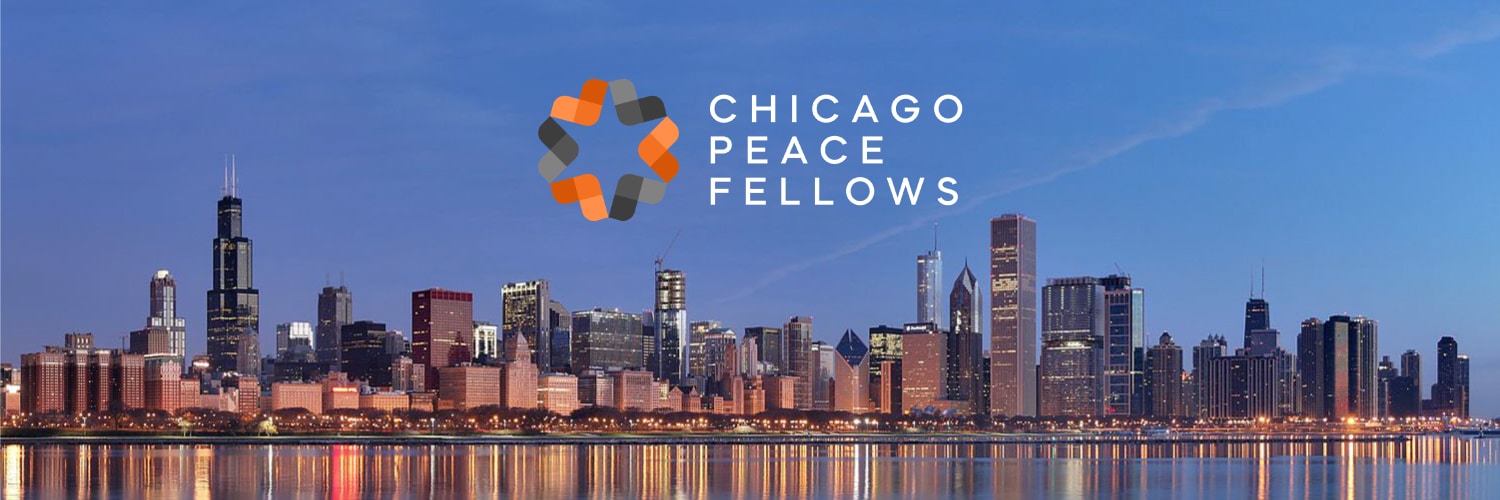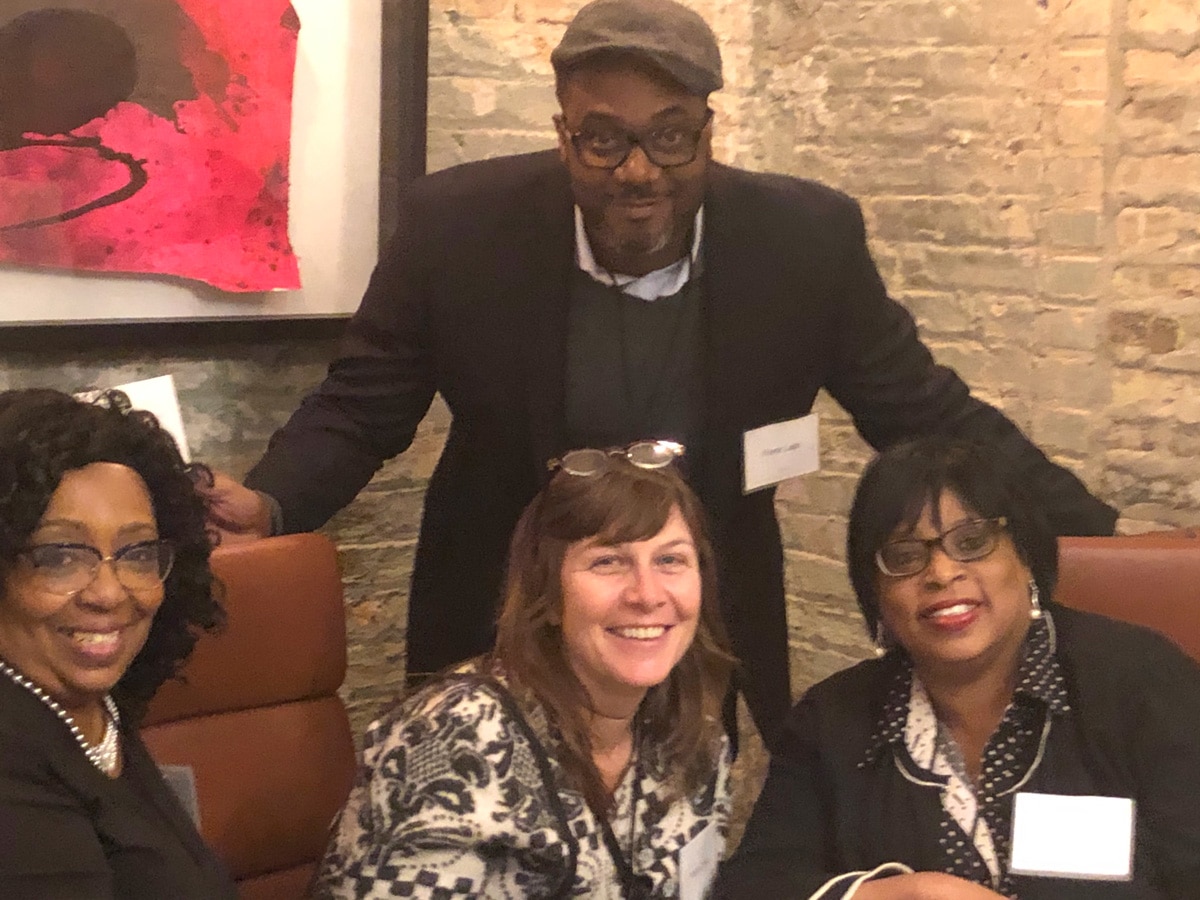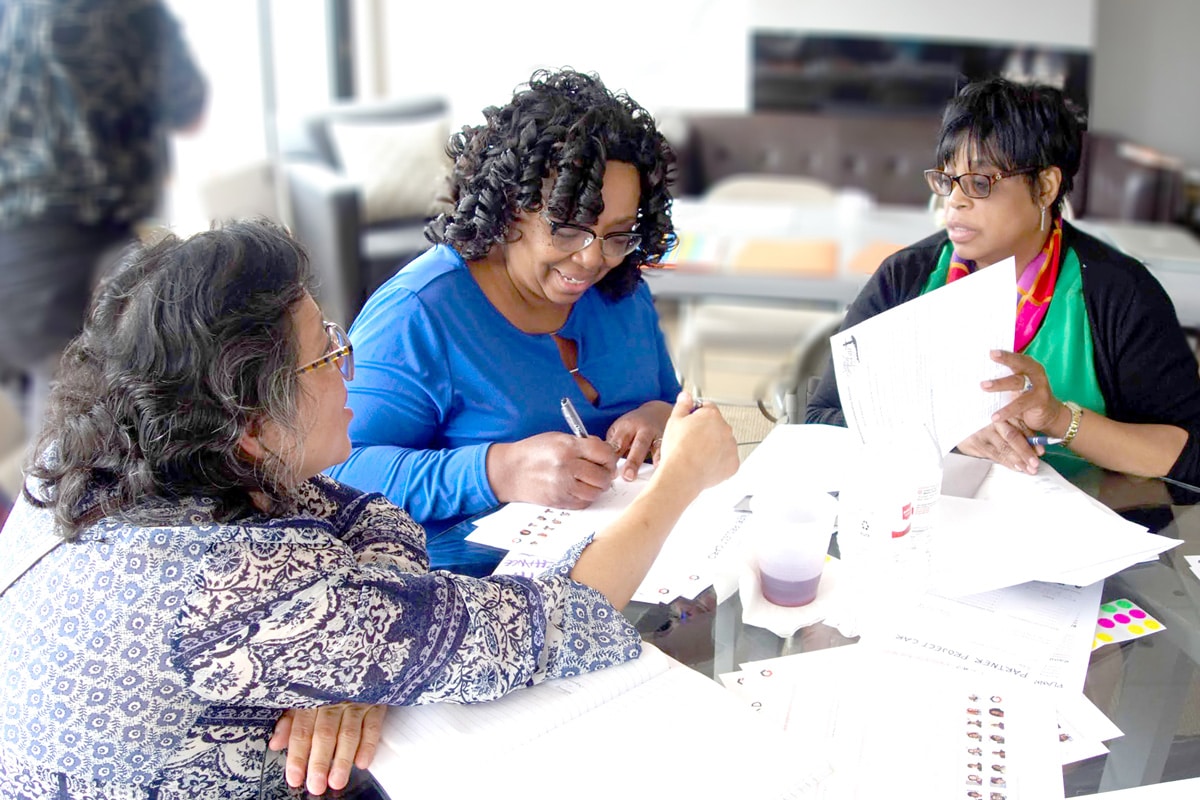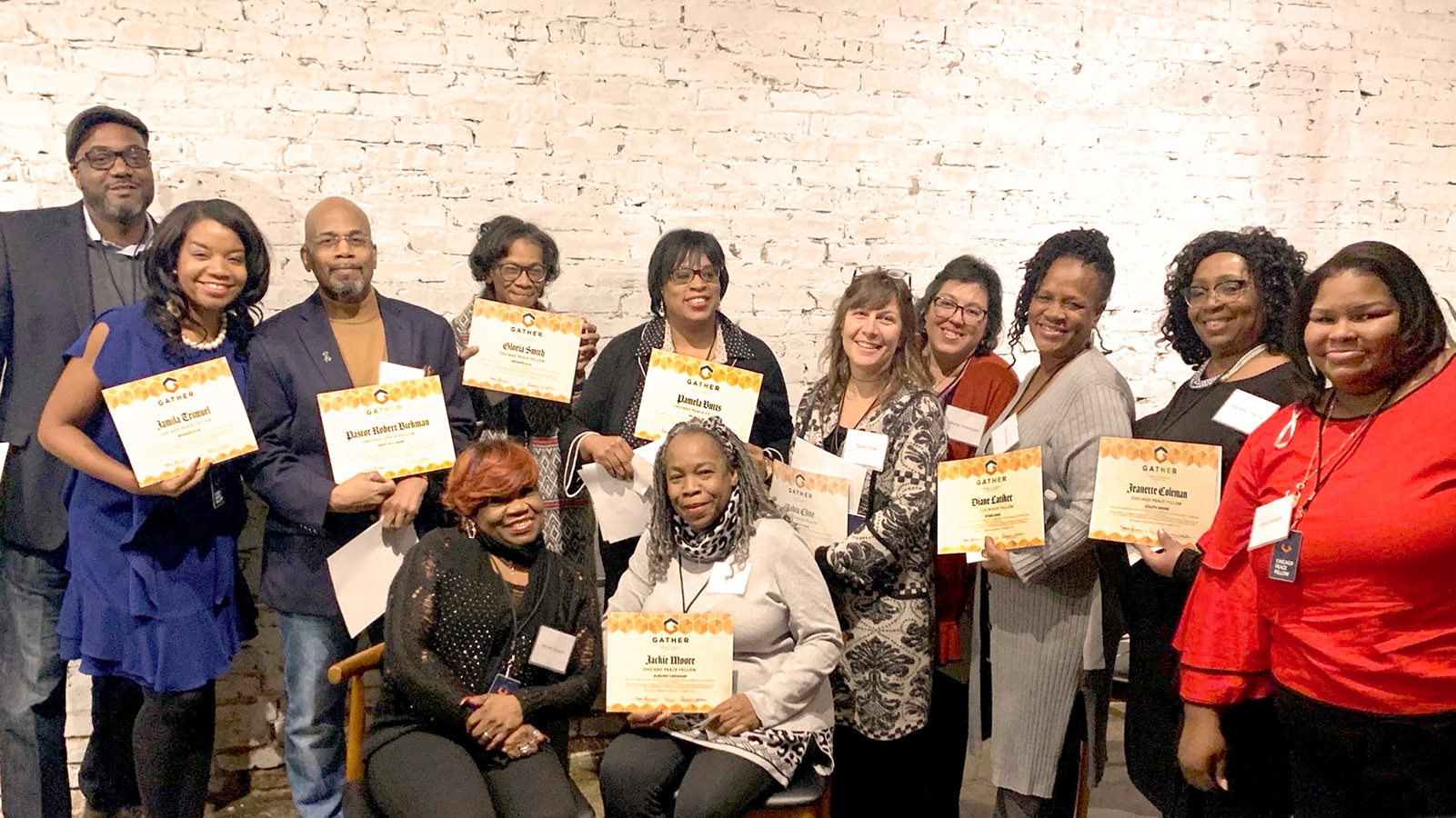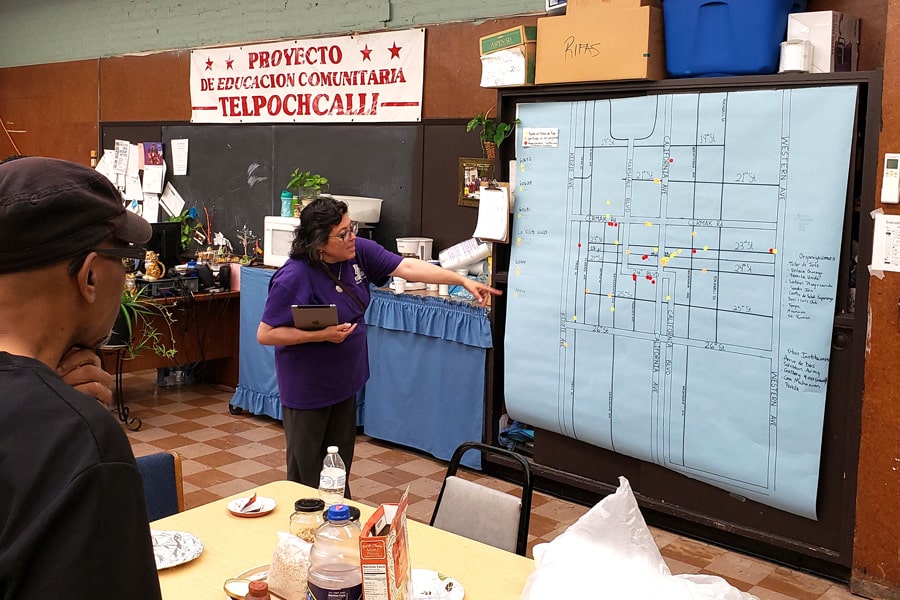Meet the 2020 Chicago Peace Fellows
The Goldin Institute invites you to learn about each of our 2020 Chicago Peace Fellows representing 14 community areas across the city. Founded in 2019 in collaboration with the Partnership for Safe and Peaceful Communities, the Chicago Peace Fellows program is the only leadership development program that is built by and for grassroots community leaders on the South and West sides of Chicago.
Peace Fellows participate in GATHER, an online asset-based community engagement course, as well as in-person training, collaborative action projects, and networking experiences with civic leaders, academic researchers, and policy makers. The Chicago Peace Fellows reduce violence by building relationships, engaging youth, collaborative peace building projects over the summer and by creating new networks among residents, families, schools, and nonprofit organizations.
ABOUT GATHER
The Fellows are learning together through GATHER, which is both a mobile platform for shared learning and a curriculum for people who want to build on the talents of their neighbors and the assets of their communities to make real and lasting change. Gather Fellows learn and work together through an innovative curriculum that comes pre-loaded on a tablet device with all the connectivity, materials, videos, practices and tools necessary to provide a mobile classroom and toolkit for community leadership.
The Chicago Peace Fellows project will connect and equip a select group of past grantees of the Chicago Fund for Safe and Peaceful Communities to reduce violence and promote peace. Chicago Peace Fellows will be the second all-Chicago cohort to utilize the GATHER platform, an online learning hub built by the Goldin Institute to empower grassroots leaders.
The participants have been selected from past grantees of the Chicago Fund. They will engage in a 14-week course of intensive shared learning as well as group projects, culminating in a graduation event in October, 2019. The curriculum has been designed in collaboration with the grantees themselves, based on their practical knowledge and hard earned wisdom, with input from a wide range of civic leaders. Fellows will reflect on their past summer work, identify successes and lessons learned, and improve their abilities by sharing strengths and learning new skills.
The Goldin Institute and the Partnership for Safe and Peaceful Communities have aligned missions that value authentic community leadership. The Chicago Fund is uniquely effective at finding motivated problem-solvers and community-builders. By connecting Chicago leaders through GATHER, their efforts to nurture safer and more peaceful communities will be more effective, interconnected and lasting.
A special thanks to the Conant Family Foundation, JP Morgan Chase, the Polk Bros. Foundation, Crown Family Philanthropies and the Partnership for Safe and Peaceful Communities for making this program possible.
To follow along the learning journey with the Gather Fellows, please sign up for our newsletter and follow up on Twitter, Facebook and Instagram.
If you would like to apply for the next cohort of Gather Fellows, please visit apply.goldininstitute.org.
A Night to Remember!
By Frank Latin, Senior Advisor, Communications
For me, the Goldin Institute’s 2019 Chicago Peace Fellows graduation ceremony was an inspiring event. The ceremony marked the completion of a six-month fellowship in which myself and 18 other committed community leaders collaborated to complete an engaging, community-focused curriculum and attend other scheduled workshops. The Chicago Peace Fellow program, with the use of its GATHER platform, is designed to share new social change tools and concepts that can assist in creating safer and more peaceful communities with individuals who already working in high-need areas on the South and West sides of Chicago.

The event attracted close to 100 people, including family, friends, colleagues and civic leaders who showed up to acknowledge the collective work of the CPF graduates. The group is comprised of individuals who lead small organizations and do not allow our even smaller budgets to deter us from doing the work that our communities so desperately need.

Our budgets and our organizations are small, but our work has a huge impact in the communities we serve.
To be honest, it was a pleasant surprise to see so many people come out to honor the work of a small group of people whose work often goes unnoticed by the mainstream. The evening came full circle for me when I ran into an old colleague at the event, Susana Vasquez, who I hadn’t seen in a while. Susana volunteered to conduct our first strategic planning session over 12 years ago. The mission and vision we crafted back then has helped guide me to this point...And here we are, the Westside Media Project is now in its 14th year of engaging and empowering community residents to utilize digital media to tell their own stories.

In the end, the ceremony not only celebrated the work of the 2019 Chicago Peace Fellows, it also highlighted one of the core beliefs at the Goldin Institute that is not universally shared throughout the philanthropic community: Leaders of color who live in the communities in which they serve are more than capable of providing solutions to problems that exist in their communities.
The Goldin Institute thanks the Conant Family Foundation, the Polk Bros. Foundation, Chase Bank, the Partnership for Safe and Peaceful Communities and our generous network of champions for community driven social change for supporting the Chicago Peace Fellows
Download the Graduation Booklet to Learn More
2019 Chicago Peace Fellows Report
For nearly two decades, the Chicago-based Goldin Institute has worked to build the capacity and amplify the voices of grassroots organizers in communities contending with the most challenging circumstances on Earth. In late 2018, the Goldin Institute was asked to design a course for grassroots organizers by the Partnership for Safe and Peaceful Communities, a coalition of 40 Chicago-based foundations who are aligning their investments to support proven and promising approaches to reducing gun violence. The Goldin Institute relied on its extensive global experience to create the Chicago Peace Fellows.
The Peace Fellows is a curriculum and fellowship designed to support individual organizers who are prior grantees of the Partnership’s Chicago Fund and are working to stop violence and create opportunities for their neighbors to collaborate in promoting more peaceful communities across the city. The inaugural class of 18 Peace Fellows graduated in November 2019 after more than six months of collaborative learning and joint projects.

The Goldin Institute designed the Peace Fellows course in collaboration with previous Chicago Fund grantees and input from a wide range of civic stakeholders. Based on the advice they received, staff adapted GATHER, the Goldin Institute’s tablet-based curriculum that teaches a series of core social change concepts and tools for authentic community engagement for grassroots leaders across the globe, to fit the newly formed group of local neighborhood changemakers, enhancing the online course with in-person workshops and meetings with a wide range of civic leaders in Chicago.
The 18 Chicago Peace Fellows were selected from a pool of over 50 applicants who all live and work in community areas on the city’s South and West sides that are disproportionately affected by crime and violence. Each Peace Fellow received a stipend and an iPad pre-loaded with the GATHER software and curriculum. Connecting Chicago leaders through GATHER allowed Fellows to explore key concepts around social change and leadership development digitally while they continued playing key roles in their community organizations as they completed the course.

On March 8, 2019, the Peace Fellows convened at DePaul University for the launch of the program where they discussed their leadership styles and got to know their peers. Over the following several weeks, the Chicago Peace Fellows developed deep bonds and determined together the principles and practices that would enable them to learn and work together as a community of practice.
The experience continued through the exercises in the curriculum and a wide variety of in-person workshops highlighting key violence prevention skills and introductions to other organizations doing important violence prevention work in the city. Fellows also had access to elected officials and institutional leaders in Chicago and beyond.

Throughout the program, Fellows participated in over 50 events and workshops hosted by partner organizations, including:
- The City Club of Chicago presentation on Crime and Criminal Justice in Chicago led by Professor Jens Ludwig of the University of Chicago Crime Lab.
- A meeting with the Violence Interruption Team at the University of Chicago Trauma Center.
- A conversation with author Edgar Villanueva about his book, “Decolonizing Wealth.”
- A conversation with Chicago artists on the Role of the Arts in Social Justice followed guided tour of the Chicago Cultural Center exhibit by Cecil McDonald, Jr.
- An Asset Mapping workshop with John Zeigler of the DePaul’s Egan Center and the Asset Based Community Development Institute.
- A workshop on appreciative inquiry followed by a guided tour of the Garfield Park neighborhood with the outreach team at Breakthrough Ministries.
- A presentation by Chicago Police Department Superintendent Eddie Johnson with a question and answer session.
- An overview of Chicago’s broader strategy to prevent violence and a conversation with the violence prevention team at the Institute for Nonviolence Chicago.
- Exploring opportunities to collaborate with the Chicago Park District over the summer.
- Conversation about the Role of Race and Representation in Violence at the Field Museum of Chicago featuring a tour of the “Looking At Ourselves” sculpture exhibit.
- A conversation with Alderman Walter Burnett about collaboration with civic leaders and city agencies.
- Exploration of the Role of Urban Planning and Civic Design in Peacebuilding at the Stony Island Arts Bank in collaboration with Studio Gang.
- Conversation about the importance of evaluation and data with the University of Chicago Crime Lab.
- A visit to Indiana to meet with the 10 Point Collaborative in Indianapolis, a local initiative to prevent violence.

These face-to-face meetings augmented the curriculum Fellows explored together using the GATHER digital platform specifically designed to enact the course’s pedagogy of learning as a community. Rather than a traditional teacher-to-student course, GATHER is made up of highly interactive chapters that guided Fellows through key concepts for social change. It then provided them space for shared reflection after they put those techniques into practice in low-stakes exercises with peers and assignments.

Towards the end of the curriculum, the Fellows planned and implemented community projects within their neighborhoods. The Goldin Institute assembled $30,000 in special funds for the Peace Fellows to execute these collaborative projects between July and September with the goal of involving community residents, creating peace, and promoting healing.
The planning process for the summer projects was likewise collaborative, beginning with the establishment of principles based on the key concepts explored during the GATHER course. The Fellows generated a wide variety of ideas together which they took back to their communities and organizations, and went through several more levels of review before they proceeded on the allocation of the funds. Moving in concert, the Fellows settled on eight summer projects, deciding how to fund each project with the $30,000 pool, acting as grant-maker as well as grantee.

Innovative, enlightening, powerful, sometimes spiritual and deeply emotional, the summer projects included an outdoor youth retreat that brought young people from different neighborhoods to an activity camp in the Wisconsin forest, a family and youth peace day in Bronzeville, a healing fair for senior citizens with yoga, tai chi and peace circles, and Passport to Peace events in parks and public spaces on the city’s South and West sides.

The 18 Peace Fellows graduated from the course on November 14, 2019, in a ceremony that they designed collaboratively, of course. Approximately 100 family, friends and supporters came out to celebrate the Fellows’ accomplishments.
The Goldin Institute’s Founders, Board Chair Diane Goldin and Executive Director Travis Rejman, welcomed the Peace Fellows to the Institute’s global community of practice, adding that the program brought home to Chicago everything they had learned around the globe.

“Over the past 17 years working in over 50 countries, we’ve seen that real and sustainable change is always rooted in the power of communities building on their assets and inviting voices people on the front lines to make decisions,” Travis said.
The Fellows took the opportunity to share “What they did,” “What they learned,” and “Where they are going.” In groups of 4-5, the Fellows relayed the most meaningful moments of their time together and inspired all those in attendance with their passion as well as the kinship and respect they had come to feel for each other.

“We all come from different points in life and we got to hear from people using resources and what they know in their communities to make a difference,” said Peace Fellow Frank Latin, founder and executive director of the Westside Media Project. “We all come together regardless of our backgrounds and what we’ve been through to try and make a better place to live.”
A 12’ long graphic timeline hung in the graduation space displaying all the events the Fellows had attended and all the workshops in which they had participated, illustrated with pictures from their highly successful summer projects.
Upon their graduation, the Peace Fellows officially joined a growing network of Global Gather Fellows currently representing 14 countries in Africa, Asia, Europe, the Middle East and North and South America. They have access to an international network for mutual support, ongoing learning and global cooperation.
Systemic and adaptive challenges facing our communities will require new approaches to see and change the system by building on our local assets and unlocking the potential of emerging leaders. To address these dynamic issues, the GATHER Global Alumni network meets online each month for workshops and discussions on themes selected by the alumni themselves. Recent workshops have included trainings on metrics and evaluation; children and armed conflict; and preventing violent extremism.
The overwhelmingly positive response from the inaugural cohort of Chicago Peace Fellows has inspired the Goldin Institute and the Partnership for Safe and Peaceful Communities to expand the Peace Fellows program in 2020.

The Goldin Institute thanks the Conant Family Foundation, the Polk Bros. Foundation, Chase Bank, the Partnership for Safe and Peaceful Communitiesand our generous network of champions for community-driven social change for their support of the Chicago Peace Fellows.
The Goldin Institute extends its deepest appreciation to the following organizations and groups who provided critical assistance, hosted workshops, collaborated on peace building projects and shared insights to make the Chicago Peace Fellows an inspiring and productive experience:
2016 Ma’at, Academy for Global Citizenship, Alliance for the South East, Agape Werks, Asset Based Community Development Institute, Atonement Church, Automotive Mentoring Group, Be Different, Black Star Project, Blocks Together, Breakthrough Urban Ministries, Bright Star Church, Brothers Standing Together, Chase Bank, Chicago Alternatives to Incarceration Collaborative, Chicago Cares, Chicago Community Trust, Chicago CRED, Chicago Cultural Center, Chicago Foundation for Women, Chicago Knights Robotics Team, Chicago Park District, Chicago Police Department, Chicago Public Libraries, Chicago Women’s AIDS Project, Chicago Youth Programs, CIGNA, City Bureau, City Club of Chicago, City Colleges of Chicago, Chopin Theater, Churchview Senior Living Facility, Community Builder, Conant Family Foundation, Crossroads Fund, Cure Violence, CNI Group, Crown Family Foundation, CWAP, Darren B. Easterling Center for Restorative Practices, David Lynch Foundation, DePaul University, DePaul University Egan Office of Urban Education, DePaul University Steans Center, GodTess, Graphics 2020, Grow Greater Englewood, Healing Home, Heartland Alliance READI Program , I Am My Brothers Keeper, Imago Dei, Imani Community Development Corporation, Institute for Nonviolence Chicago, Kids Off the Block, King of Glory Tabernacle, Ladies of Virtue , MacArthur Foundation, Maple Park Community Association, Maple Park UMC, Marion Nzinga Stamps Youth Center, McCormick Foundation, Metropolitan Family Services, Metropolitan Peace Academy, Metropolitan Planning Council, Mikva Challenge, Missionary Baptist Church , M.I.T. School of Urban Planning, NeighborSpace, New America Foundation, New Eclipse Community Alliance, Northeastern Illinois University, OperaMatic, Partnership for Safe and Peaceful Communities, Phoenix Life Solutions, PNC Bank, Polk Bros. Foundation, Precious Blood Ministry of Reconciliation, Project, R.A.G.E., Rebuild Foundation, Resurrection Project, Restore Justice Illinois, Stony Island Arts Bank, Studio Gang, Taylor Investment Partners, Teamwork Englewood, Technology for Social Good Lab, Ten Point Coalition, Indianapolis, Telpochcalli Community Education Project, ThinkInc., TREAD, UCLA Department of Black Studies, United Way, University of Chicago Crime Lab, University of Chicago Law School, University of Chicago Trauma Center, University of Illinois, Urban Labs, US Bank, Veterans for Peace, Westside Justice Center, Westside Media Project, Woods Fund, Young Chicago Authors.
Special acknowledgment to those partners, mentors, consultants, friends and colleagues whose ideas and expertise made the Chicago Peace Fellows possible:
Marshan Allen, Michael Aguhar, Daniel Ash, Shannon Barr, Abraham Bendheim, Chris Bennett, Deborah Bennett, Esteban Bey, Mecca Bey, Gia Biagi, Garenne Bigby, Quincy Bingham, Eddie Bocanegra, Vaughn Bryant, Mary Scott-Boria, Bliss Brown, Walter Burnett, Asiaha Butler, Elena Calzada, Jacob Campbell, Annmarie Chereso, Linc Cohen, Daniel Cooper, Kevin Coval , Tara Dabney, Vanessa Dereef, Katherine Elmer-Dewitt, Stacy Erenberg, Jessa Dickinson, Alejandro DiPrizio, David Doig, Anders Donskov, Lisa Dush, Leif Elsmo, Kahil El’Zabar, Sheena Erete, Derrick Faulkner, Gary Feinerman, Ghian Foreman, Christian Forman, Craig Futterman , Theaster Gates, Joseph Genslak, Teny Gross, Janet Hanley, Troy Harden, John Hardy, Nekenya Hardy, Charles Harrison, Damion Heron, Jeffrey Hodges, Khari Humphries, Shruti Jayaraman, Frankie Johnson, Tonika Johnson, Terence Keel, Jody Kretzmann, Teddy Krolik, Rebekah Levin, Keith Lewis, Eric Ljung, Dan Lurie, Kristen Mack, Mallory McClaire, Cecil McDonald, Ceasar McDowell, Delano McIntyre, Tawa Mitchell, Michelle Morales, Sheelah Muhammad, Amalia Nieto-Gomez, Mark Orthman, Ashley Perkins, Jobi Peterson, Christy Prahl, Julian Posada, Tony Raggs, Leslie Ramyk, Kim Redding, Robert Rejman, Raymond Richard, Art Richardson, Jose Rico, Robin Robinson, Jane Saks, Anton Seals, Kimberly Smith, Alexis Smyser, Rahmaan Statik, Justice Stamps, Arny Steiber, Ole Qvist-Sorensen, Arloa Sutter, Bruce Taylor, Tess Torziata, Susana Vasquez, Edgar Villanueva, Cortez Watson, Alaka Wali, Artimmeo Williamson, John Wolf, Lora York, John Zeigler.
Celebrating the Graduation of the Chicago Peace Fellows
By Ethan Michaeli, Senior Advisor for Communications

For Velvian Boswell, being a Chicago Peace Fellow transformed the way she saw her own neighborhood. Speaking to a room packed with family, friends and supporters at the Peace Fellows’ graduation, Boswell, who works as a recovery specialist for the Chicago Women's AIDS Project, recalled the component of the curriculum in which they were asked to create asset maps of their own neighborhoods. In the beginning, Boswell didn’t think there were many assets in her community, Englewood on the city’s South Side.
“At first, I thought of all the liquor stores,” Velvian said, “but I had to take a step back.”
“We have a lot of history, a lot of people, and a lot of resources in Englewood. That is what I learned as a Chicago Peace Fellow.” -- Velvian Boswell
Boswell was just one of 18 grassroots organizers who graduated from the first cohort of Chicago Peace Fellows on November 14 at an event space on Division Street in the Wicker Park neighborhood. Each of the Fellows lives and works in neighborhoods dealing with disproportionate rates of crime and violence, and they celebrated months of work sharing their experiences, learning new techniques, and expanding their networks as well as acquiring new contacts and resources.

The Fellows will join the Goldin Institute’s international cohort of grassroots organizers around the world who are developing innovative strategies for empowering their neighbors and fostering healing in areas torn by war and natural disaster. The Peace Fellows were trained through GATHER, which is both a software and a curriculum designed by the Goldin Institute to facilitate peer-to-peer learning.
“This is one of those moments when life comes full circle,” said Travis Rejman, the Goldin Institute’s executive director, introducing the Peace Fellows at the event.

Travis described the Goldin Institute’s origins in 2002 during a week-long conclave in Chicago that brought together an unprecedented roster of grassroots organizers from around the globe. Participants studied the city’s rich history of community organizing, and shared the wisdom they had acquired in their work in different cities before collectively conceiving of an organization that could help grassroots organizations foster conversations, build their networks, and tap new resources.
“We’ve been pursuing those principles and putting them into practice over the last 17 years in over 50 countries. The key to our mission to create spaces for grassroots leaders to learn and work together so they can connect around issues they care about and collaborate across borders.” -- Travis Rejman
The Peace Fellows program, Travis explained, was built on the lessons learned through these years of work and especially through the international GATHER Fellows. The asset map Velvian described is just one of the exercises designed to “understand power, privilege and race, and the intersectionality of how those forces intersect with our peace building.” All of the components of the curriculum were calibrated to “center voices of those who are often excluded, knowing that those who have the most at stake and the most wisdom.”

Overall, the Peace Fellows participated in 50 workshops, trainings and meetings with civic leaders, at least one event every two weeks and many weeks with multiple events. In addition to the shared learning sessions, the Peace Fellows collaboratively planned 8 projects in the summer and beyond with special funding from the Chicago Fund for Safe and Peaceful Communities.
“Over the past 17 years working in over 50 countries, we’ve seen that real and sustainable change is always rooted in the power of communities building on their assets and inviting voices people on the front lines to make decisions,” Travis said.
Goldin Institute Program Coordinator Burrell Poe praised the Peace Fellows for their dedication and assiduity, and welcomed them into the “community of practice” with the GATHER Fellows. An organizer himself, Burrell said the mutual support was essential for effecting change.
“It’s really about how do people who do the work stick together, how do they support each other,” Burrell said.
“At the end of the day, if I’m someone who’s working hard in Englewood, it’s nice for me to know someone who’s working hard in Austin. That connection is powerful because we’re doing the work in our own communities and sometimes we can feel so alone and being together a community of practice is so important.”
Peace Fellow Frank Latin, the founder and executive director of Westside Media Project, recalled one workshop at the Institute for Non Violence Chicago, where they spoke with case workers and others engaging with young men in the community at high risk for being both perpetrators and victims of violence. Many of the case workers have personal experience with street violence, and Frank remembered the conversation as robust and incisive, piercing the myths that cloud the picture of what is actually happening in neighborhood like Austin on the city’s West Side.

“I got to hear directly from people who look, quite frankly, just like me,” Frank said.
“We got to hear directly from people working on the front lines, some of the challenges that don’t make the news, like why are people carrying guns. Not everyone who is carrying a gun in Austin is a predator. A lot of people were trying to protect themselves, but once you get arrested, you’re going to same jail cell.” -- Frank Latin
Frank continued that it as a resident of another neighborhood handling high levels of violence, he knew already that it was a “no brainer necessity” to work with those whose past includes criminality. But often, the prevailing narrative in mainstream media, the academy, and even among social services are wary of direct contact with those most likely to be involved in violence.
“We all come from different points in life and we got to hear from people using resources and what they know in their communities to make a difference,” Frank said.
“We all come together regardless of our backgrounds and what we’ve been through to try and make a better place to live.”
Peace Fellow Dawn Hodges, executive director of Imani Community Development Corporation in South Chicago, talked about the collective planning process for deciding how to fund the summer projects. It took several rounds of very active conversations and lots of sticky notes as well as a few digital tools, but in the end, the Peace Fellows had decided on eight innovative initiatives, each of which involved multiple Fellows.

The summer projects included “Passport to Peace” events, community fairs with peace circles, tai chi classes and other services for community residents, the “Youth Exchange,” an overnight retreat at a Wisconsin camp site for young people from different neighborhoods, and a retreat for the Peace Fellows themselves, a rare opportunity to reflect and discuss.
“The powerful part was those who got funded less but needed more and those who got more we all ended up sharing, so all the projects that were going to be funded got funded,” Dawn explained.
Maria Velazquez, executive director of Telpochcalli Community Education Project in the Little Village neighborhood, admitted that she was not particularly tech-savvy when she received the iPad preloaded with the GATHER software. But she quickly got help both from the Goldin Institute staff and from other Peace Fellows.
That sense of camaraderie was key to the GATHER curriculum’s success for Maria. After 17 years at Telpochcalli, a mostly volunteer organization, she focused on learning new techniques that will make collective decision more effective. But overall, Maria was thrilled to find a new cohort of peers with whom she can share her experiences and challenges.
“Often, we feel very isolated like we are the only ones doing it. Now I have a team of people I can turn to.” -- Maria Velazquez
The event continued with comments from other Fellows as well as supporters including Conant Family Foundation Executive Director Leslie Ramyk, who collaborated closely with Travis to fund the first class of Peace Fellows and pledged to do what she could to make sure there would be additional cohorts.
"Thank you for being the inaugural Chicago Peace Fellows. I’m so excited with everything that happened this year. The least I can do – and what I must do – is raise the money so we can do this again.” -- Leslie Ramyk, Conant Family Foundation
The graduation celebration closed with a rousing – if slightly off-key – group sing-along led by Peace Fellow Gloria Smith, who wrote new lyrics under the title “We are building up a new world” to the tune of the traditional song “Jacob’s Ladder.”
The Goldin Institute thanks the Conant Family Foundation, the Polk Bros. Foundation, Chase Bank, the Partnership for Safe and Peaceful Communities and our generous network of champions for community driven social change for supporting the Chicago Peace Fellows
Download the Graduation Booklet to Learn More
Peace Fellows Present to Partnership for Safe and Peaceful Communities
On July 24, a delegation of Chicago Peace Fellows presented their work together thus far to a large meeting of 2019 grantees as well as the funders of the Partnership for Safe and Peaceful Communities, a coalition of more than 40 Chicago philanthropies and donors who have provided grants to community groups trying to reduce violence in disproportionately affected neighborhoods on the South and West sides.
The Peace Fellows were part of the agenda for the conclave at the Hatchery, a spacious new not-for-profit on the West Side that provides training as well as modern facilities to aspiring food entrepreneurs, including equipment for cooking, freezing and storage as well as events.
Attending on behalf of the Goldin Institute were Fellows Maria Velasquez, Robert Biekman, Jacqueline Moore, Pamela Butts, Jamila Trimuel, and Gloria Smith along with artist Cecil McDonald, who is documenting the program in video and photography, Lisa Dush, a professor at DePaul University who is conducting a professional evaluation of the GATHER software and curriculum, and Goldin staff members Oz Ozburn and Burrell Poe.
Burrell began with a brief summary of the genesis of the Peace Fellows, explaining that Goldin staff conducted extensive interviews with previous grantees of the Partnership to find out what they needed and how a curriculum could serve them. All of the Peace Fellows are previous grantees of the Partnership, and many have received current grants as well.
Each of the Fellows then took turns presenting different aspects of the program, interjecting their personal experiences and observations at appropriate moments along the way.
Maria described the strong sense of camaraderie among the Fellows, and extolled the practical benefits of collaboration and sharing:
[quote]I’m just so happy to be a part of this cohort, because it makes our communities strong. -- Maria Velazquez[/quote]
Robert explained that he was thrilled to discover that the Peace Fellows curriculum was focused on action, rather than theory, as well as accountability that came through honest collaboration and support. In his work as a pastor and organizer, Robert has participated in many different programs and fellowships, but he often lost interest as they proved impractical or didn’t sufficiently involve community residents. He remained highly involved with the Peace Fellows, however, because it provides access to places and people who would not be available otherwise. In particular, the curriculum has allowed him to continue the connections he established with young men in different stages of the criminal justice system beyond the short terms of the grants from the Partnership. He has even been able to build bridges between different groups working on violence-related issues from multiple angles and involve them in efforts to craft solutions.
[quote]Using the tools that GATHER has provided in the curriculum and also working with Peace Fellows, it has allowed me to take that moment and make it into a movement, to go from a place where we are doing community outreach to do community engagement, to be able to build the kind of relationships that provide long term sustainability for the efforts we are engaged in. -- Robert Biekman[/quote]
Robert continued, “GATHER has allowed me to create a community of practice with all of those who are directly impacted by the issues of our community, to gather us together to see what are the real key issues and most importantly to invite them to participate in making the changes that are necessary because those who are closest to the problem often have the best solutions.”
“So often, we do this work, and we do it by ourselves, and for me what this has provided is a watering hole where I’m able to go in the midst of all the other work we do in order to drink deeply with others who are doing the work we are doing. That gives us a personal sustainability to each of us.”
Gloria said that the individual Peace Fellows are all part of broader group of community-based organizations that often work together. She recently moved to Chicago after the death of her brother, Phillip Jackson, and took over as executive director of the organization he founded, the Black Star Project. She has hit the ground running, maintaining and even expanding partnerships and initiatives, and on one day, Gloria found that she had three commitments for the same day, so she asked another Peace Fellow, Velvian Boswell, to stand in for her. She was greatly appreciative for that level of support from the Peace Fellows.
[quote]“We’re all connected. We’re all a network of hope. -- Gloria Smith[/quote]
Pamela Butts echoed the sentiment that the collaboration with her peers – people with similar experiences in community work – has been extremely rewarding: “Peace Fellows has given us an opportunity to develop relationships, resources and opportunities we never dreamed of.”
[quote]These are folks who have been out there on the front lines for years just doing the work just because people have needs. -- Pamela Butts[/quote]
Jamila said she had participated in multiple fellowships and residencies, and wasn’t inclined to apply for another one, but when she received the e-mail from the Goldin Institute during a college tour with the girls in her program, she thought the Peace Fellows would be different. She was intrigued by the prospect of working with other organizers in Chicago:
[quote]I wanted to connect more with people on the ground. It’s hard to find that kind of learning community here in Chicago. -- Jamila Trimuel[/quote]
“I took a pause (to check out the Peace Fellows) because I realized for the first time I would be part of a fellowship program where there would be people who are on the ground who are from communities, who love Chicago like I love Chicago and who want to ensure that Chicago is a better place to live and to serve.”
Jamila recounted several emotional meetings, including one where the Peace Fellows advised the staff at the Field Museum of Natural History about the future presentation of an exhibit with a racist and colonialist past. On another group outing to a neighborhood, the Peace Fellows saw a police action, while across the street children were playing, a sad juxtaposition that reflected the realities for too many families in Chicago.
“We know we’re here to stay we’re here to make a true, lifelong difference in our communities and that’s what’s so special about Chicago Peace Fellows,” Jamila summed up.
Jacquelyn explained that the Peace Fellows had agreed on a set of guiding principles that were used to evaluate all proposals for summer projects, which would be supported by a fund assembled by the Goldin Institute. Among other principles, the group agreed the summer projects should promote peace, embrace new challenges and accountability, and include authentic community participation.
Ultimately, the group approved eight different projects, all of which incorporate multiple principles, ranging from information fairs to help ex-offenders expunge their records to a retreat for the Fellows to practice self-care and reflection.
“The projects are all very different. Collectively, they serve the entire city, are a great opportunity to show off what we’ve learned while we’re promoting peace and giving all of you guys the opportunity to partner with us,” Jacquelyn said.
Peace Fellows Trained in Kingian Nonviolence
On Monday, July 8, the Institute for Nonviolence Chicago hosted a Kingian Nonviolence workshop for the Chicago Peace Fellows and grantees of the Chicago Fund for Safe and Peaceful Communities. The Institute for Nonviolence is a street outreach organization that specializes in connecting with individuals who are most at risk of being a victim or perpetrator of violence. They also provide support for families of victims of violence and help people returning from prison find resources such as jobs, housing or health related services. The Chicago Fund for Safe and Peaceful Communities provide small grants of up to $10,000 to grassroots community leaders who are hosting activities in neighborhoods on the West and South sides that have high rates of violence. All of the Chicago Peace Fellows were recipients of these grants in 2018.
The Institute for Nonviolence Chicago invited the Chicago Peace Fellows and grantees of the Chicago Fund for Safe and Peaceful Communities for training led by Benny Lee on the steps and principles of nonviolence as taught by Martin Luther King Jr to his organizers in communities across the nation. Benny is a former leader of the Vice Lords, a notorious gang on the West Side, who spent decades in prison. Benny talked openly about his stint on death row after he and several others were charged with inciting a prison riot in the ‘70s. He shared about how nonviolence principles changed his life and helped him learn how to solve conflict and fight for justice in a different way.
Through the training, Benny shared his vision for building the Beloved Community, an all-inclusive society built around universal acceptance, healing from trauma, and celebration of successes. He encouraged the participants of the workshop to join him and each other in building the Beloved Community.
The Chicago Peace Fellows and other grantees asked questions and participated in conversation with Benny and each other. One Chicago Peace Fellow, Adi Lerner, who works at the Westside Justice Center as a program director, asked,
[quote]“How do we truly embrace nonviolence in violent circumstances?” -- Adi Lerner, Chicago Peace Fellow[/quote]
Adi stressed that often she finds many of the people she works with are victims of overt violence but also violent systems such as forced poverty, mass incarceration and systemic oppression. Benny shared his experience in fighting against these forces for returning citizens, people coming home from prison, and how he has made breakthroughs in returning their rights such as getting licenses that they were previously prohibited from getting by the state of Illinois. He said the principles are his grounding metrics for how he takes action to fight for peace.
The Nonviolence Principles are as follows:
- Nonviolence is a way of life for courageous people.
- Building the Beloved Community is the goal.
- Attack the forces of evil, not persons doing evil.
- Accept suffering without retaliation for the sake of the Just Cause.
- Avoid inner-violence of the spirit as well as outwardly physical violence.
- The universe is on the side of justice.
Overall, the group really enjoyed the experience and connected with one another around the material. The Institute for Nonviolence hosts 3 day nonviolence workshops that are open to the public. Please visit their website to learn more about the organization, their upcoming events and trainings.
Neighbors Celebrate Family and Youth Peace Day
Along with my collaborator Gloria Smith of the Black Star Project, I am pleased to share an update from the 2019 Family and Youth Peace Day. This project is one of eight projects the Chicago Peace Fellows collaboratively designed and supported to put our principles and insights into practice to build peace over the summer.
What has your team accomplished over the past two weeks?
There were over 200 people participating in the event on June 27! There were several organizations from Bronzeville involved. Chicago Cares coordinated the planning, Chicago Youth Programs on 54th and Prairie was the site of all activities, the Community Builders had a table offering affordable housing, Pastor Chris Harris of the Bright Star Church brought a bus load of youth from Kenwood, Cigna brought 60 volunteers who played games with young people, prepared lunch, and built five raised garden boxes. 2016 Ma’at helped with these projects and helped build planters while seniors from our asset mapping project came and participated. The event started at 10 am and ended at 3 pm.
All Bronzeville organizations described their programs and all present felt the event was successful.
What have you learned?
Organized groups that keep their commitments can be very impactful in very resource challenged communities.
What is coming up that's important?
In the coming week, we will begin installing block club signs and planning for additional Family and Youth Day celebrations. We need all the help we can get.
How can other Peace Fellows or the community support you?
As we complete our asset mapping and begin planning what the community wishes to see built in their community, some of GATHER staff may be helpful in creating the plan!!! If there are Peace Fellows or neighbors who have built housing or created community plans, they also could be helpful.
Peace Fellows Visit Telpochcalli in Little Village
On Friday, June 14, Chicago Peace Fellow Maria Velazquez invited her peers to the Telpochcalli Elementary School, an institution in the Little Village neighborhood that the community organization she leads, called the Telpochcalli Community Education Project, helped to create.
Maria hosted a street festival for members of the community to enjoy time together to start the weekend. The event featured a youth band and stoneware made by students of the school. The festival featured an all-youth band and food provided by local residents. The tortillas were hand-made and the aguas frescas (juice) were freshly squeezed. Around 100 members of the community sang and danced to enjoy the breezy spring evening.
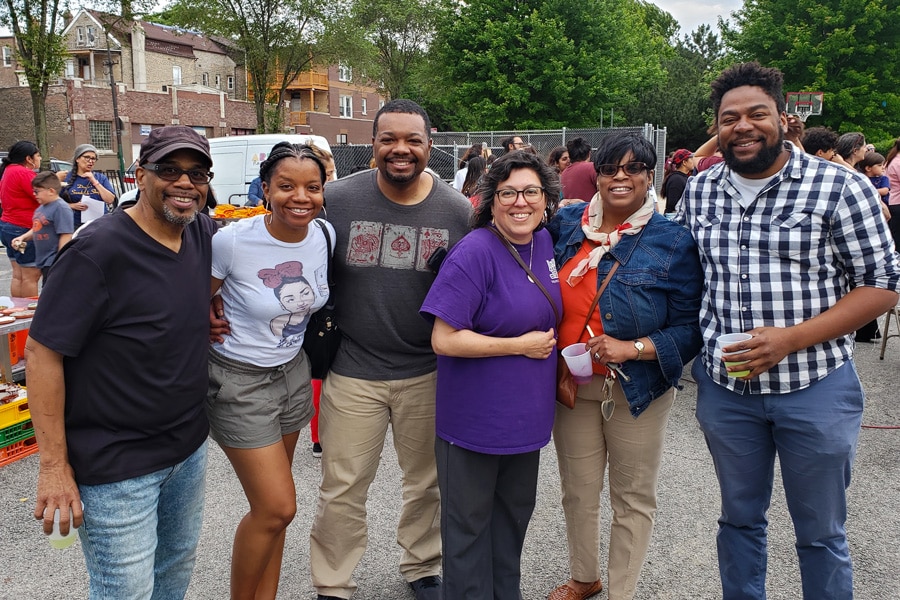
According to their website, “Telpochcalli (Nahuatl for "house of youth") is a small school dedicated to integrating the Mexican arts and culture into an innovative academic and social experience and development of fully bilingual/biliterate students in English and Spanish. The school is comprised of students, teachers, parents and artists who aspire to nurture an understanding and appreciation of the self, family, community and world.”
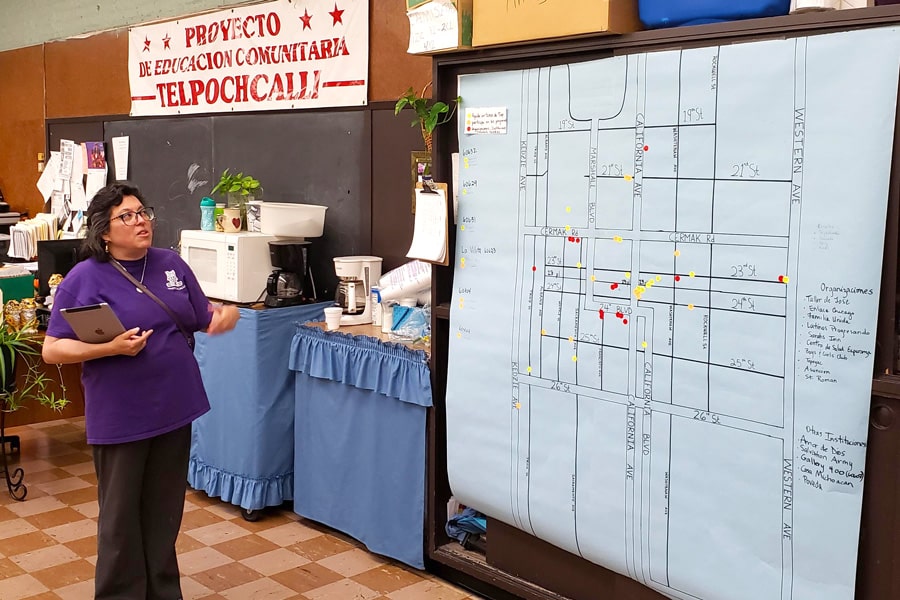
Maria, a Chicago Peace Fellow, has been the executive director of the Telpochcalli Community Education Project for over three years. She started out as a volunteer at the school and when the position of executive director opened up, she was reluctant to apply at first. Maria can be shy but she is very loving and compassionate and works really hard to take care of the people she serves. She explained, “I do this work to help people. I really like to see people happy.”
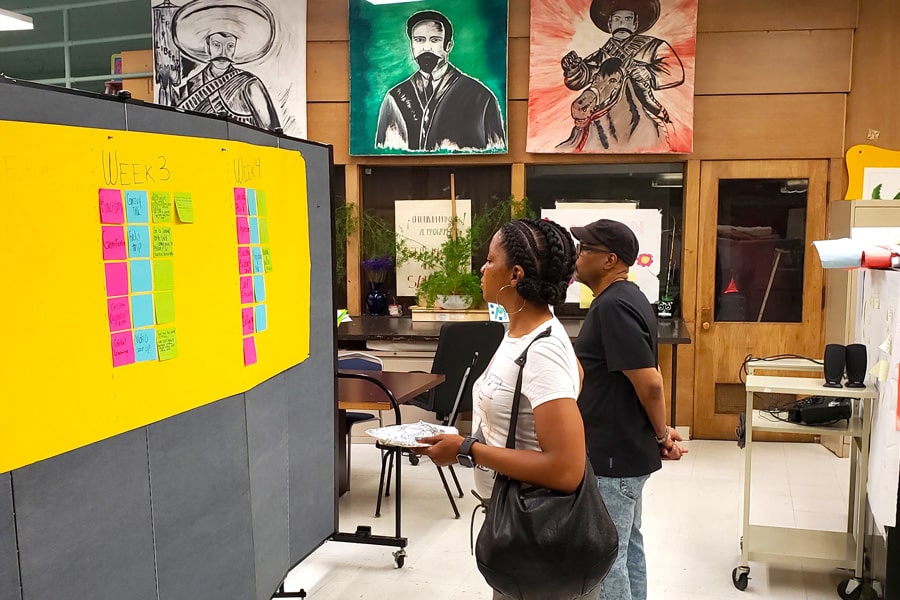
Maria gave other Peace Fellows a tour of the school and their community space. She showed her “living” asset map where she encourages parents and volunteers to add what they see as assets in the community to the map. She noted that it helps people see the value of their community and people really like doing it. Maria talked about her summer program with teens that is completely led by the teens. This summer, they are focusing on health and how they can have an impact.
“It took some time to get them going [in reference to the teen council], but now they are leading it and we are now working to get younger people involved so that they can learn how to lead earlier".
The Telpochcalli Community Education Project’s roots go back to 1998, when a group of parents in the Little Village neighborhood got together to advocate for better educational facilities. Just as it is now, Little Village’s population was growing fast with new immigrants as well as many young families, and the parents were upset by the failure of the Chicago Public Schools to fulfill a promise to build a high school in the neighborhood.
Many parents participated in a sit-in and hunger strike that got public attention and ultimately, a new administration at CPS agreed to build the Little Village/Lawndale High School. Under Maria’s leadership, the Telpochcalli Community Education Project has continued to be a strong advocate for Little Village, recently stopping a merger of the Telpochcalli Elementary School, which is already overcrowded, with a high school in the area.
The Chicago Peace Fellows will be active all summer with events and knowledge sharing. Stay tuned for more articles and opportunities to join us.
Peace Fellow Spotlight: Gloria Smith
What are some important updates in your current work?
The Black Star Project is a multifaceted initiative known for its actions with programs on education, culture, economic and workforce development, mentoring, tutoring and youth development, public policy and advocacy and violence prevention. Our programs encourage a holistic, intergenerational approach to community building.
Phillip Jackson, our founding director, passed away in November 2018. Phillip was a great inspiration to many and we have been challenged to determine how best to continue cultivating and sharing his wisdom with the world. While many of our supporters keep up with our work through the Black Star Project website and Facebook page, we also have a radio program on WVON on Saturdays at 6 p.m. and a periodic newsletter that is shared with a national and international audience.
Some of our recent projects include economic empowerment and non-profit management workshops, Saturday university academic programs, and Becoming Chicago’s Next CEO, a summer program for interns interested in learning investment skills. Most recently, we participated, along with our Young Black Men of Honor, in the Chicago Community Trust’s On the Table event by sending a letter to Mayor Lori Lightfoot sharing their thoughts on addressing violence in the community.
As Phillip's sister, I along with my staff and a host of organizations and supporters remain very much engaged in “the good work” that Phillip left for us to do and to share with as wide a community as possible.
How has GATHER informed the work that you do? Have you made any meaningful connections between GATHER and your work?
“Gathering” is at the heart of our work at The Black Star Project. We know this: What has always strengthened and encouraged Black and Brown people is our histories of struggle, our creativity, our humanity in the face of trauma, our connection to elders and ancestors, and the love and encouragement we must pass along to our young people.
We believe that we need to be together. To spend time with each other – in small gatherings and large, sharing the wisdoms we’ve learned from our experiences. Our programs share the resources of history, spirit and culture that have provided strength and renewal to people struggling for the expression of their humanity in Chicago and elsewhere in the world. This is work we’ve done since our founding in 1996, work we remain committed to, and work that is very similar to the peacemaking efforts of GATHER and the Goldin Institute.
Chicago Peace Fellows Practice Appreciative Inquiry at Breakthrough Ministries
On Wednesday, May 1, the Chicago Peace Fellows met at Breakthrough Ministries in East Garfield Park for our fifth workshop focused on the concept of Appreciative Inquiry. We started the workshop with a tour of the building where Breakthrough Ministries delivers services for residents of Garfield Park on the city’s West Side.
Breakthrough Ministries has been working in the community since 1992, when it opened a men’s shelter. They provide groups, job training and other services to aid their population. The Chicago Peace Fellows asked questions about their services and how they came to be. They were able to ask employees about their ambitions and learned how the organization empowers employees to lead initiatives meant to serve their population.
After the tour of the facilities, we sat down to learn more about Appreciative Inquiry and the principles that underlie the skill. Goldin Institute Executive Director Travis Rejman gave a crash course on how Appreciative Inquiry is about genuinely listening to people that you speak with to hear their ideas, confront your own assumptions and invite others to share their goals, ambitions and vision for the future.
We then broke into pairs to practice asking and answering appreciative questions. There was a lot of laughter and authentic interaction. One of the fellows expressed how this framework helped them learn how to better interact with people that are facing social emotional challenges such as depression. By learning how to ask questions and focus on what works while truly appreciating their responses, we can interact in more constructive ways.
After the workshop on Appreciative Inquiry, the Peace Fellows toured the entire Breakthrough Ministries campus, which includes several buildings in the neighborhood, a women’s shelter, food pantry, facility for outreach workers and the Family Plex, which houses a coffee shop, gym and meeting rooms.
While on that tour, the Peace Fellows witnessed a large-scale police operation in progress at an apartment building that was not part of Breakthrough Ministries’ campus. The incident was a reminder to the Peace Fellows of the urgency and relevance of their work.
Peace Fellow Jamila Trimuel, founder of Ladies of Virtue, an award-winning mentoring and leadership program that has empowered over 1,000 girls, ages 9 to 18, on the South Side commented:
[quote]“It was a great tour. I really enjoyed it. I’m still decompressing and reflecting on the fact that we literally saw armored trucks and all those police officers along with helicopter hovering around. That was crazy! But I also enjoyed seeing the children laugh and play inside at the Family Plex while all that was going on outside."[/quote]
